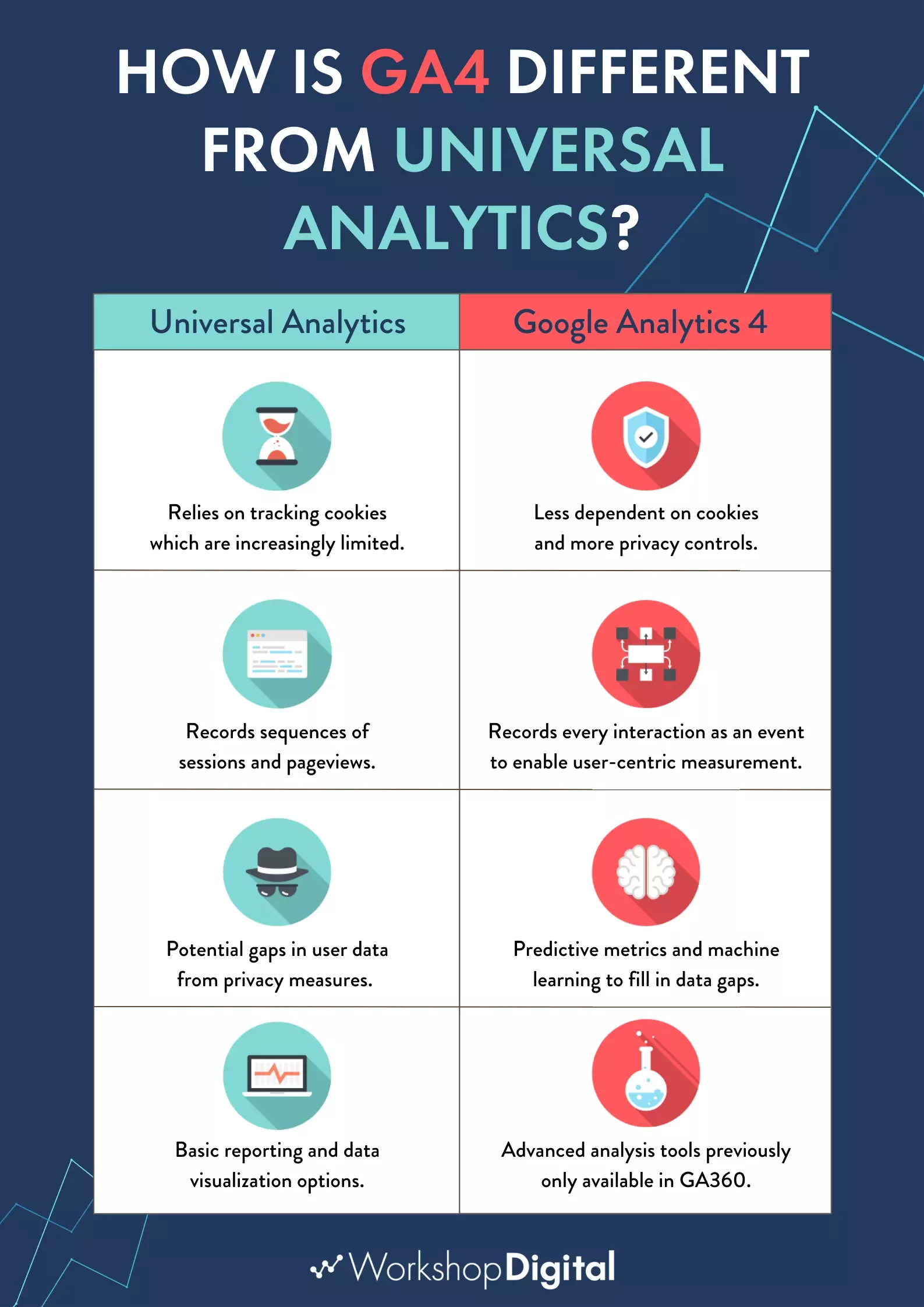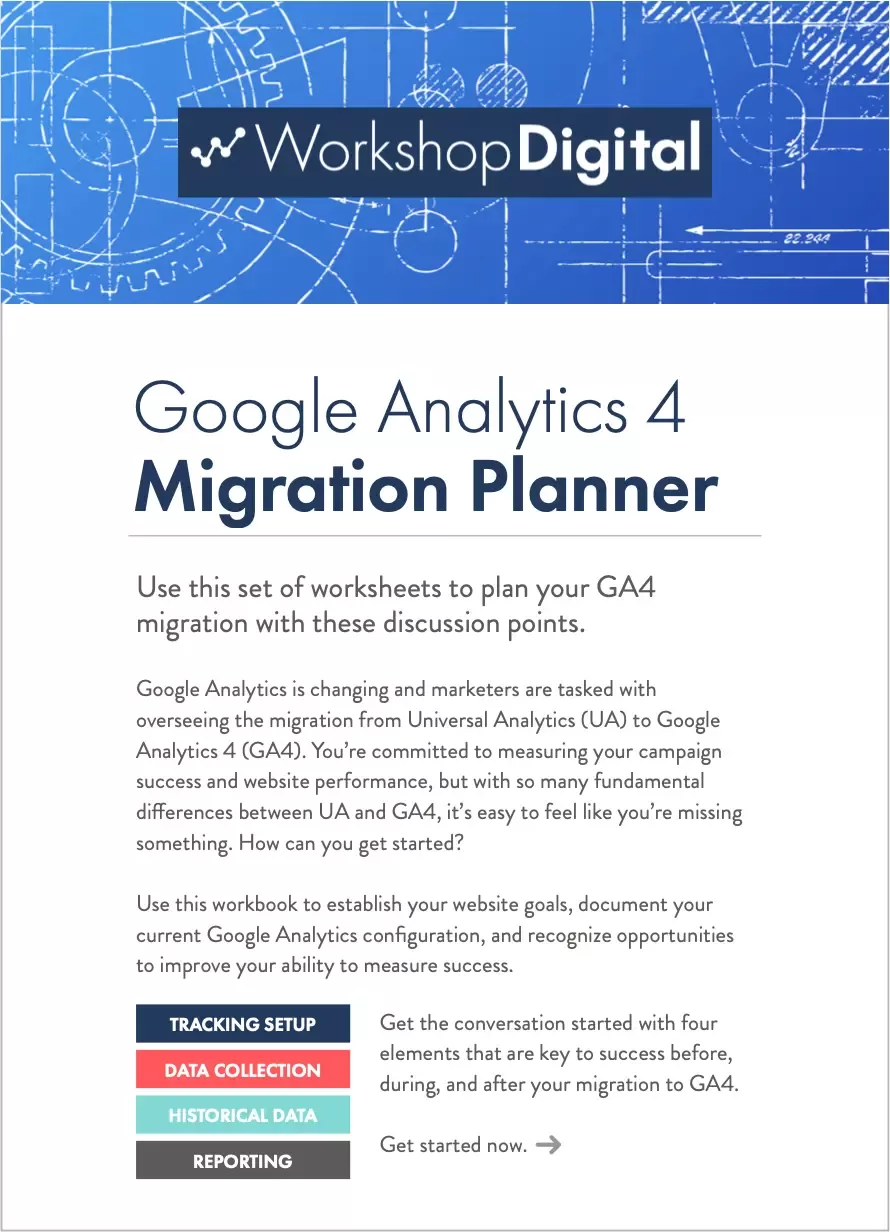On July 1, 2023, Universal Analytics (UA) stopped recording your website traffic. If you had GA4 set up before the deadline, you shouldn’t have any pauses in your data. But if you haven’t, don’t worry! We have you covered with our 15-point GA4 Migration Planner, which is available as a free PDF download. It walks you through a pre-planning checklist that covers your tracking setup, data collection, historical data, and reporting needs.
Even with GA4 being set up, there are still fundamental differences between GA4 and Universal Analytics, and it’s important to understand them to analyze your data and create strategies.
Differences Between Universal Analytics and GA4
The most important thing to understand is how GA4 and Universal Analytics differ in how they capture, process, and visualize your website's data. Here is an infographic laying out the main differences:

Preparing for the change starts with understanding these four key differences between GA4 and Universal Analytics:
User Tracking and Cookies
Universal Analytics relies on tracking cookies which are increasingly limited by browser security settings, operating systems, and ad blockers.
GA4 is less dependent on cookies and has more user-friendly privacy controls built in so you can remain compliant with GDPR, CCPA, and probable future regulations. Google is also phasing out third-party cookies, hence GA4’s lack of dependability on them.
Sessions and Pageviews vs. Events
Universal Analytics primarily focuses on sessions (visits to a website) and pageviews to help marketers understand how visitors engage with their site.
GA4 records every interaction (including session starts and pageviews) as separate events to enable much more granular, user-centric measurement. You can mark events as conversions to help with filtering your data.
Gaps in Data Collection
Privacy measures, opt-outs, and regulatory compliance create large gaps in Analytics tracking that can muddy the waters and make it hard to trust the data.GA4 attempts to close this gap by using machine learning to model predicted user behavior and paint a clearer picture of conversions, attribution, and segmentation.
Reporting and Data Visualization
Universal Analytics offers basic reporting and charting options with more advanced features (and less sampling) available in their premium GA360 suite of tools.
GA4 provides many advanced analysis tools for free, such as pathing and BigQuery exports. You can also build out custom reports in the Exploration section to show only the data you want to look at, versus having to search for it in the Reports section.

Another main difference in terms of reporting is that Universal Analytics allows users to save filters and reuse them, while in GA4, you have to create them from scratch each time you need them.
What are the Similarities Between Universal Analytics and GA4?
Well, not many. As we wrote previously, even the interface and navigation changed with the transition to GA4. There is a steep learning curve when you make the switch, so set aside time to start learning the new platform, rather than waiting until it's too late.
Looking to Advance Your Google Analytics Knowledge and Configuration?
If you still have questions about Google Analytics 4 or just need to talk through your GA4 configuration, let’s chat. We can help you ensure you're getting the most out of your instance.

"The migration process in transitioning our two websites to GA4 was exceptionally smooth. The learning curve is still very much in progress, but we have faith that our team at Workshop Digital will be with us every step of the way."
Erika Gay, Marketing & Communications Manager
Get The GA4 Migration Planner
Use this workbook to establish your website goals, document your current Google Analytics configuration, and recognize opportunities to improve your ability to measure success.

This blog post was originally published on April 4, 2022, and was updated and republished on March 5, 2024.
